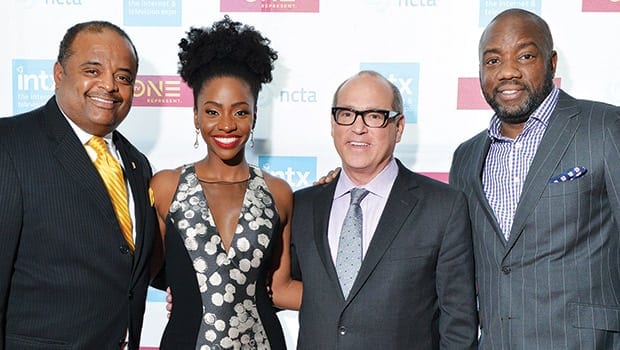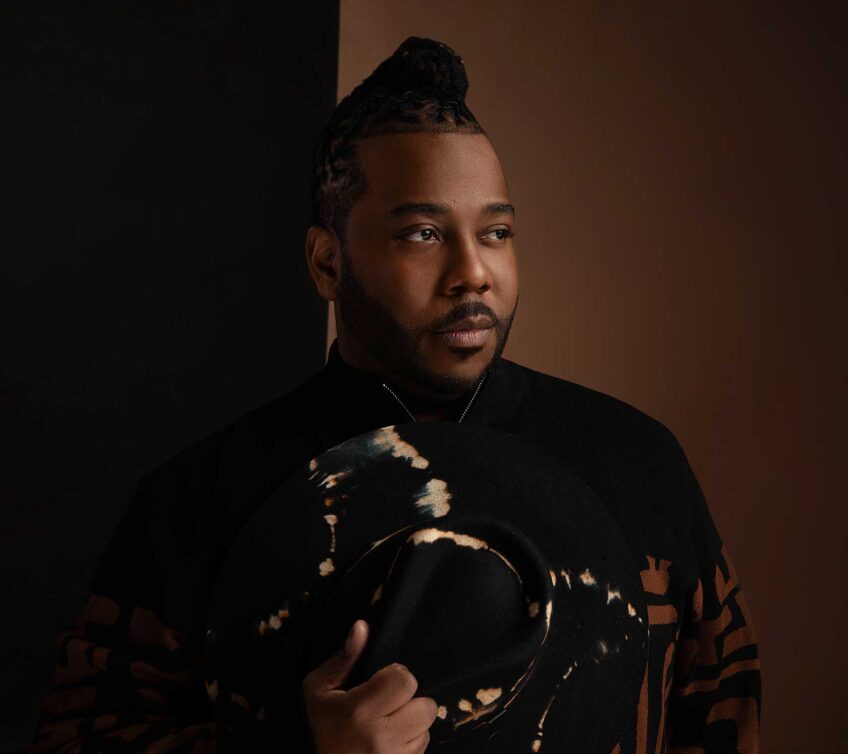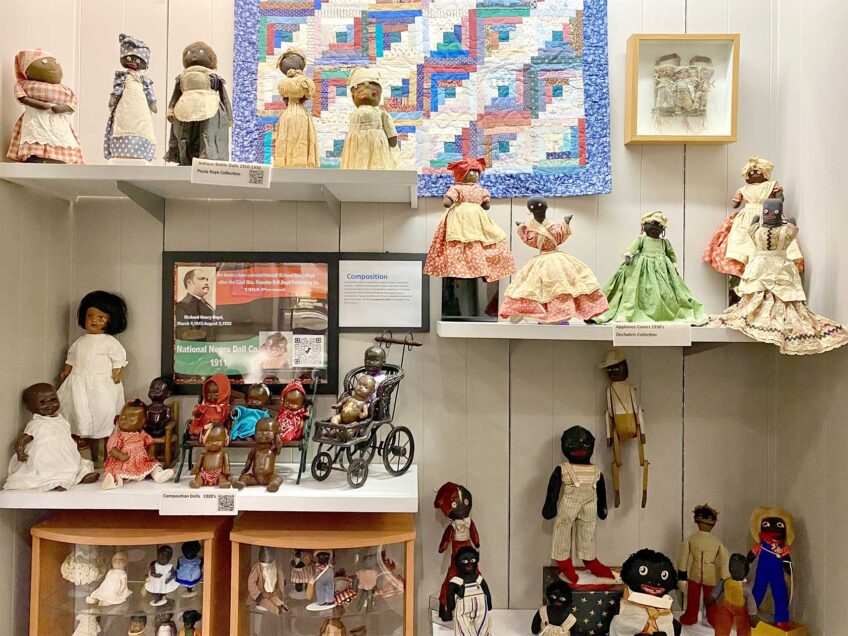
In a career that includes print, radio, television, and digital, Roland S. Martin has continually pushed the envelope for excellence in journalism by asking the tough questions and demanding answers, doing the research, and challenging those who simply throw out facts without being able to back them up.
Named Journalist of the Year in 2013 by the National Association of Black Journalists, Martin is host and managing editor of TV One’s first national daily news program, “News One Now.” The program presents issues and stories from the world of politics, entertainment, sports and culture that have an impact on the African American community.
In 2016, News One Now received its first NAACP Image Award nomination for Outstanding News/Information (Series or Special).
Martin, who was in Boston on May 17 for the INTX: The Television and Internet Expo at the Boston Convention & Exhibition Center, spoke to the Banner about his role as managing editor of “News One Now,” the current media landscape and the importance of good journalism.
You seem to me to be on a crusade to make sure Americans are accountable by holding our feet to the fire in terms of the important issues of the day, from race to politics. Why is that important to you?
Roland Martin: First and foremost, I wouldn’t call it a crusade. It’s really what any journalist should do. I think one of the mistakes we often make is that we allow conversations to take place and we don’t check folks while it’s happening. People will make comments factually incorrect. They’ll make assumptions. And then we fall to the trap of ‘Well, I really can’t press somebody because I don’t want to be perceived as being on one side or the other.’ Whereas my position is ‘No.’ You must challenge someone, and I believe the biggest mistake in media today, especially with mainstream media, is that there’s an unwillingness to be able to challenge people where they are and to confront them on the issues that are often ignored. We have a unique responsibility because of the audience that we serve to do that. I don’t want someone to turn to TV One and essentially see “Morning Joe,” from MSNBC, CNN”s “New Day,” “Fox & Friends,” “The Today Show,” “Good Morning America,” “CBS This Morning” and I’m seeing the same show with all black faces. There has to be another objective, another focal point.
What frustrates you about the current media landscape?
RM: I think what frustrates me the most is an unwillingness to take a deep dive into issues dealing with race where it’s abundantly clear. How many times can CNN and Don Lemon have an “N-word” conversation, but then will they go as in depth to deal with the racial animosity that exists among Donald Trump supporters? I was watching “Morning Joe” having a conversation about this anger among white men and the opportunities they’ve lost since the early ’70s, and they just sort of glossed right over it, as opposed to asking the deeper question, ‘How can many of these same white men complain about economic opportunities when a lot of them are union members and they’re voting against their own special interests?’ And I’m watching it, I’m listening to it, and they sort of ran right by it. That is what really jumps out. This unwillingness to go there as it relates to white voters but will quickly go there when it comes to African Americans. You’ll see a significant debate after a black riot or whatever. White kids lose their minds — you don’t see a questioning of their upbringing, their morals, their values. You don’t see anyone asking where their fathers are, stuff along those lines. And you’ll see those double standards.
I saw the interview with Pastor Steve Parson. It was amazing that he thought he could get away with not answering your questions about what the pastors spoke about with Donald Trump.
RM: That’s a mistake again, when you have journalists unwilling to get the answer. My issue wasn’t that Trump met with black pastors, as I said in that interview. Many Republicans had met with black pastors. The problem was that he couldn’t even say what they talked about. That interview was scheduled to be probably eight minutes but ended up being 18:24 because I would not relent, because my deal is, ‘No, I’m going to extend this because you need to answer this question.’ Here’s what ends up happening. What happens is, when most reporters ask those questions, they’ll maybe ask it at most two or three times and then they’ll move on because they want to get to the rest of the questions. I would rather stay on that one question if that person is unwilling to answer, then go to the rest of the questions because that bails them out. His inability to answer the question, just like all the other pastors who have met with him [Trump], have refused to come on. Pastor Darrell Scott, he’ll jump on every other network but won’t come on TV One because I am not going to let him off the hook like CNN, FOX, and MSNBC will.
With a 24-hour news cycle, how do you go about choosing the headlines and the topics to present to your audience?
RM: I’m host and managing editor of the show so I have final authority. For me, it isn’t a matter of looking at your major headlines, your major stories. It’s instinctively knowing what black folks think about and talk about. Because I’ve run three black newspapers — I was the founding editor of blackamerica.com, this is my 11th black media experience — so I have a very keen sense of those stories that resonate with African Americans that somebody else may very well ignore. We’ll look at those different things, and I want unique voices. Even if there’s a story that doesn’t have a specific black angle, ‘What is our black perspective on it?’
You’ve interviewed a who’s who from the worlds of politics, business and entertainment. Is there someone that you’ve wanted to interview that got away?
RM: Well, first of all, President Obama has only given us one interview in seven years. We hit him up every three months trying for a new interview. He seems to give everybody else an interview. I certainly think he needs to sit down with us because there are a lot of questions that I have that some might think are tough. Maybe the White House thinks that I’ll be too tough which is one the reasons they won’t sit down for an interview. There’s so many folks who I’ve actually interviewed and have had on the air. I can’t think of anybody. There are others, people who we want to talk to again. We’ve been able to with this show, and before that, “Washington Watch” (our Sunday show). We have been able to talk to a who’s who in the political world.
I think also what has been interesting is that a lot of people don’t talk about, and what people don’t realize, is the number of African Americans who are in entertainment who understand our value. When they have a project that is coming out, they make it clear ‘We want to talk to Roland Martin and to TV One.’ That’s important because when they make it clear to those networks and to those movie companies that we matter, that certainly benefits us, but they also understand they have a place that they can go to, they can talk about things ordinarily that they’re not going to talk about. When Kerry Washington sits down for an hour-long interview and talks more than just about “Scandal,” her marriage, and what she’s wearing, and she can actually have a substantial conversation about the issues that she’s passionate about, for us, it’s important to be able to have that outlet.
When the morning show first began, did you have any goals in mind, and have they changed in the three years since you’ve been on?
RM: Absolutely. I think when you launch a show like this here, it’s a start. You’re trying to establish your base and the thing for me now is I have a very high standard. There’s more things that I want to do, graphically. There’s more things I want to do in field shoots. I push, push and push my staff to understand how hard we must go because I’m not interested in being the same show. I am extremely impatient with that. I want us in a new studio. I want us with more space. I want a different look. I want to be bigger. I want to be bolder. I’m constantly pushing, pushing and pushing, and it drives a lot of my staff crazy, but I’m not interested in a steady path.
I’ve always said — and this is the thing that always bugs me — there’s a belief among a lot of people when you get something from black media it’s less than. There’s a belief that black media can only attract C, D-level talent. There literally is that mentality. I’ve always said ‘No, black media should be positioned to attract A-level talent, pay them accordingly, and deliver a product that is just as good or even better than what they will see on mainstream.’ I don’t tolerate, ‘Well, we’re a black network.’ I don’t tolerate, ‘Well, we don’t have this, we don’t have that.’ Just like I didn’t tolerate it, running black newspapers. That is a mentality that you have to have but you have to make it perfectly clear to every staff member that I’m not accepting anything less. When I was at CNN I never felt CNN was better than TV One. There were more things I could do because of the resources and the size of CNN but there are things that I could do at TV One that I couldn’t do at CNN.


![Banner [Virtual] Art Gallery](https://baystatebanner.com/wp-content/uploads/2024/04/Cagen-Luse_Men-at-store-e1713991226112-150x150.jpg)

![Banner [Virtual] Art Gallery](https://baystatebanner.com/wp-content/uploads/2024/04/Cagen-Luse_Men-at-store-e1713991226112-848x569.jpg)

